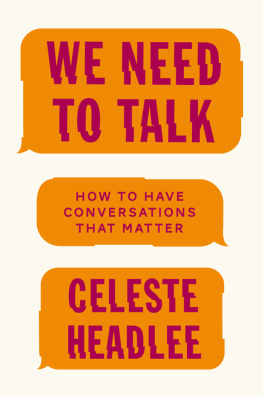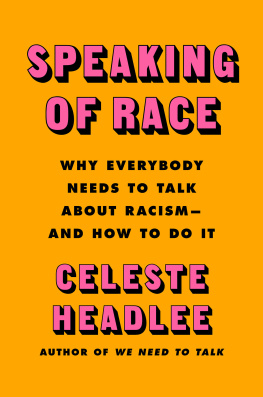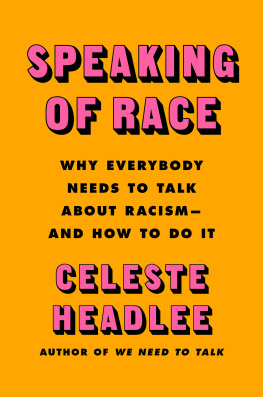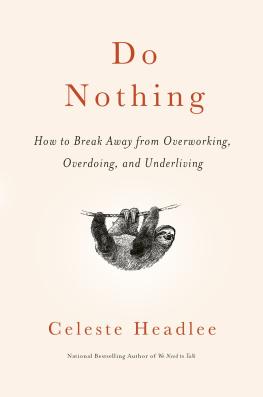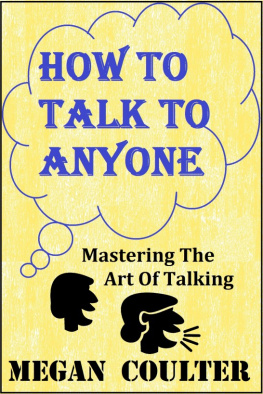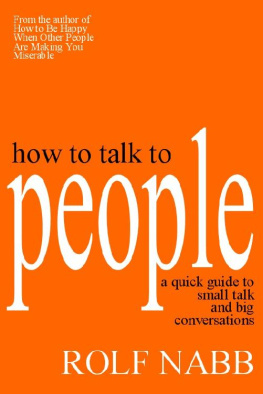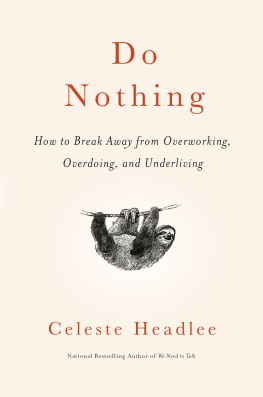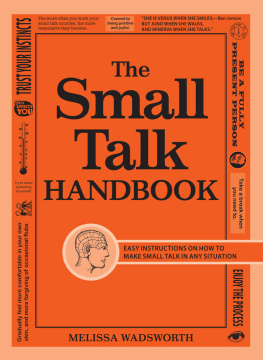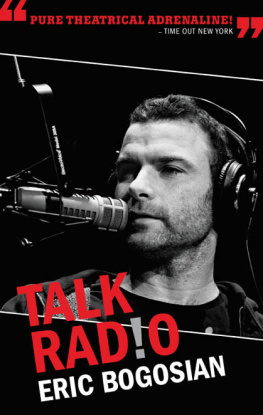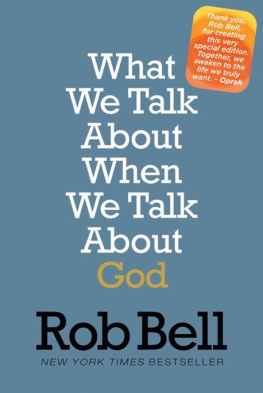CONTENTS
Guide
Australia
HarperCollins Publishers Australia Pty. Ltd.
Level 13, 201 Elizabeth Street
Sydney, NSW 2000, Australia
www.harpercollins.com.au
Canada
HarperCollins Canada
2 Bloor Street East - 20th Floor
Toronto, ON M4W 1A8, Canada
www.harpercollins.ca
New Zealand
HarperCollins Publishers New Zealand
Unit D1, 63 Apollo Drive
Rosedale 0632
Auckland, New Zealand
www.harpercollins.co.nz
United Kingdom
HarperCollins Publishers Ltd.
1 London Bridge Street
London SE1 9GF, UK
www.harpercollins.co.uk
United States
HarperCollins Publishers Inc.
195 Broadway
New York, NY 10007
www.harpercollins.com
COVER DESIGN BY JOANNE ONEILL

WE NEED TO TALK. Copyright 2017 by Celeste Headlee. All rights reserved under International and Pan-American Copyright Conventions. By payment of the required fees, you have been granted the nonexclusive, nontransferable right to access and read the text of this e-book on-screen. No part of this text may be reproduced, transmitted, downloaded, decompiled, reverse-engineered, or stored in or introduced into any information storage and retrieval system, in any form or by any means, whether electronic or mechanical, now known or hereafter invented, without the express written permission of HarperCollins e-books.
FIRST EDITION
Print ISBN 978-0-06-266900-1
EPub Edition September 2017 ISBN 978-0-06-266902-5
FOR GRANT
I wanted to be a better person so I could be a better mom.
On January 13, 1982, a tragedy occurred just outside Washington, DC. More than six inches of snow fell at Ronald Reagan National. The airport was closed for most of the morning and reopened at noon. Air Florida Flight 90 had already been severely delayed when the captain had to make a choice about whether or not to take off. He could wait a little longer and have the plane deiced one more time, or he could depart immediately and try to get his passengers back on schedule. It had been forty-nine minutes since the plane was de-iced. He chose to take off.
We know from the planes voice recorder that soon after takeoff, the first officer tried to warn the captain that something was wrong.
FIRST OFFICER: Look how the ice is just hanging on his back there, see that? See all those icicles on the back there and everything?
CAPTAIN: Yeah.
FIRST OFFICER: Boy, this is a losing battle here on trying to de-ice those things; it [gives] you a false feeling of security, thats all that does.
[Some minutes go by]
FIRST OFFICER: God, look at that thing, that dont seem right, does it? [3-second pause] Ah, thats not right. Well
CAPTAIN: Yes, it is, theres 80. [Referring to the airspeed]
FIRST OFFICER: Naw, I dont think thats right. [7-second pause] Ah, maybe it is... I dont know.
What neither pilot realized was that the readings in the cockpit werent reliable because the instruments were clogged with ice. Also, the captain never turned on the heater in the planes engines. About thirty-five seconds after the plane left the ground, we have this exchange from the cockpit:
FIRST OFFICER: Larry, were going down, Larry.
CAPTAIN: I know it.
The plane slammed into the Fourteenth Street Bridge and then plunged into the Potomac River. Seventy-eight people died; only five ultimately survived.
The crash of Air Florida Flight 90 is seen as a pivotal moment in the development of airline safety standards; it prompted the Federal Aviation Administration (FAA) to study how often a plane should be de-iced, how to create longer-lasting de-icing chemicals, and how airplane instruments are affected by cold temperatures. Experts also spent a lot of time studying that exchange in the cockpit, captured by the black box.
Twenty years later, I read about this incident while researching a story and it made me rethink my entire philosophy on conversation. Most communication experts who listened to the black box recording concluded that copilots should be trained to be more direct with their captains. But my first thought when I read the transcript was that we need to train pilots to listen better. Id never before considered that improving conversational techniques could be a survival skill.
It may seem that the stakes will never be that high for most of usthat lives will never hang in the balance of our conversations. But let me ask you this: have you ever been admitted to a hospital? Oftentimes, lives are at stake. Communication failures led to 1,744 deaths in American hospitals between 2009 and 2013, and that includes only the cases that were tracked because a malpractice suit was filed. Communication failures is a fairly broad term used to describe everything from a night nurse failing to relay vital information to the nurse working the next shift to a doctor prescribing treatment without reviewing a patients chart. It also includes breakdowns in communication with patients and their family members, who often arrive at the hospital anxious and confused.
Imagine for a moment how important it is to get these conversations exactly right. The need for brevity and efficiency must be balanced with careful listening. There are any number of emotional factors (physical pain, stress, confusion, anger) that could derail such a conversation and an equal number make it vital that the exchange be clear and comprehensive.
Personally, Im grateful lives dont hang in the balance when I converse on the radio every day. But important, life-changing events are influenced and affected by the words we choose to say or leave unspoken.
Take a moment to consider how many opportunities you may have missed, how many outcomes in your life may have been altered because of poor communication. Could you have landed that dream job if youd nailed the interview? Saved a relationship if youd been more open about certain issues? What about that political conversation at Thanksgiving dinner that got out of hand; was there a different way to defend your principles so that your cousin didnt storm away from the table (and still wont return your text messages)?
After I read the cockpit transcripts from Flight 90, I spent a lot of time reflecting on how many times Ive failed to get my point across in a conversation and how often Ive misunderstood what someone else was trying to tell me. Ive also realized that saying the wrong thing in a conversation is a universal experience. Weve all lost something because of what we said or didnt say, what we failed to hear, or what we heard and misunderstood. So we can all benefit from learning a better way.
Some of my greatest insights have come about as the result of failures. And one of my most valuable lessons in listening resulted from my failure to listen. Two days after the massive earthquake in Haiti in 2010, I spoke on air with a woman in Michigan named Mallery Thurlow. She had been trying for two days to reach her fianc in Port-au-Prince and had been unsuccessful. She was desperate to reach him or anyone else who might be able to tell her if her loved ones were alive or dead.
Our production staff worked tirelessly to track down her fianc, France Neptune, and we brought them both onto the air. Mallery and France heard each others voices for the first time since the earthquake and my cohost and I listened as the couple spoke with each other, relief and gratitude audible in every syllable. It was moving for all of us. Up to that point, we were listening to a powerful conversation, but I should have stopped congratulating myself over a well-planned segment and really listened to where the discussion was headed.
Next page
